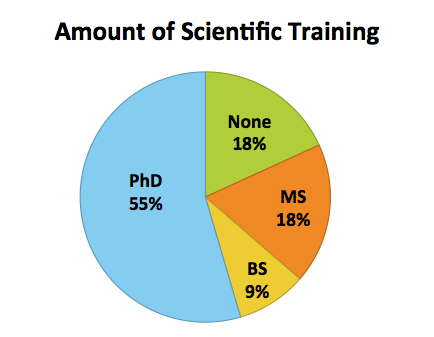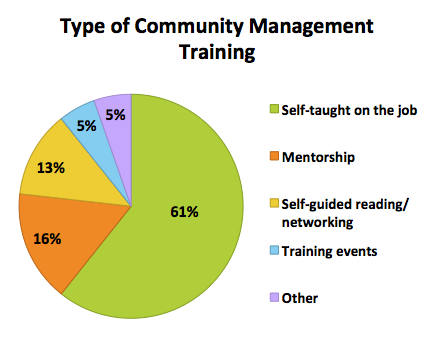Having received over 100 responses, we’ve begun analyzing the State of Scientific Community Management Survey. Read on for more details of some of the trends we’ve seen so far.
If you’re working to build communities within science and haven’t yet taken the survey, we’re leaving it open a little longer, so please do add your data points to the overall picture.
One of the aims of the survey is to get an initial picture of who’s working in scientific community management – and how they got there. We’re curious about previous training, ongoing professional development opportunities, and many other factors.
Have PhD – will transition?
The first result that has jumped out to us is that the majority of community managers have some scientific training.
Fifty-seven of the 100 complete responses collected by the end of June were from people responsible for community engagement in their organization. Of those 57 community managers, four fifths (47 of 57, or 82%) said they have scientific training. For most, this was a PhD degree (30 people, or 64% of those with scientific training). There were 10 people with master’s and 5 with bachelor’s degrees (Figure 1).

While it’s not unusual for scientific career paths to fork, especially post-PhD, it would be interesting to learn more about how scientific community managers transition from studying or practicing science to working on community engagement. As many of the community managers we’ve met in recent Q&As describe, the practice of research is supported or augmented by a variety of activities that could capture someone’s intellectual interests and sense of purpose. Perhaps if we collected personal stories from each of the survey respondents they would contain similar details about becoming fascinated with matters of communication and collaboration in parallel with research topics?
Self-taught community-building skills are the norm
Almost two thirds of community managers (35 of 57, or 61%) are self-taught on the job when it comes to community management skills (Figure 2), and for a bit below half of them (25 of 57, or 44%) it is their first community management role.

While learning on the job was the number one way respondents picked up community-building skills, mentorship came in second, and self-guided reading and professional networking came in third.
The smallest number of people—only three—reported attending conferences or training courses with relevance to community-building. We’d be interested to know what these were and what materials were used.
The lack of on-the-job training likely reflects the fact that scientific community management is still a nascent profession – not yet fully and consistently defined, and without any established professional training routes. That’s where we expect our Community Engagement Fellows Program to come in. In addition to training a cohort of fellows directly, we’re looking forward to collecting, producing, and sharing the training resources that could help professionalize the practice of scientific community management.
Pretty sure I was one of the 3 respondents who attended a conference and a training course.
The conference was the Science of Team Science conference. Related to my attendance at the conference was a “toolbox” workshop at my university by Stephen Fiore. Fiore was invited to my university due to his presentation at a National NSF EPSCoR meeting (which I also attended). I was only partially supported by my science community to attend the SCiTS conference.
I also attended a Ragan Communications conference. Although ostensibly about being a communicator, it also touched on several community management issues. I was fully supported by my science community to attend the conference.
I received monetary support from my science community by making the case that these events are professional development (which they are!) and my community is connected to universities which support professional development and conference travel for their staff.